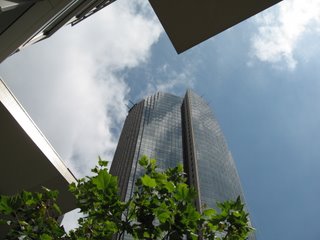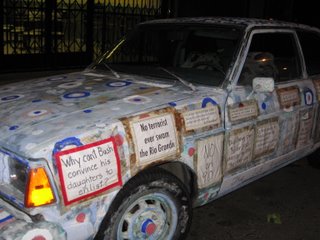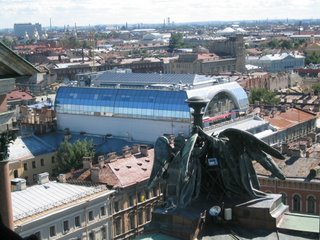


On Wednesday, I went to a book reading at Diesel bookstore in Oakland.
Mary Roach was promoting her newest book,
Spook. I had read Roach's earlier book
Stiff and found it immensely entertaining, so I was curious find out about this author's humor. She did not disappoint.
Sadly, I did not buy her book at this time (although I do plan to read it) instead I bought the newest
Walter Benjamin book, I just couldn't help myself, I saw it and I bought it. Simple as that.
Speaking of books:
Last week I read two seemingly different books:
The Painted Bird by Jerzy Kosinski and
Freud's Vienna by Bruno Bettelheim.
I picked up
Freud's Vienna with the interest of expanding my fin de siècle Vienna history interest. The first essay, also the title of the book, does cover that topic. Bettelheim outlines Freud's rise from provincial Jew to a doctor. He explains the tenuous position Freud held because he was Jewish and the toxic atmosphere in Vienna at this time related to this issue. Which of course would come to head in World War II. The two proceeding essays continue this subject. If Bettelheim had written a whole book dedicated to this topic, I would have been pleased. The other essays cover other subjects from those of an autobiographical nature to the questions about Jews. One particular question he presents: "why didn't the Jews resist Nazi orders" really caused me to consider the Holocaust, again. It is a horror that we all recognize, but the reality and calamity of it has dissipated from our awareness. I have been becoming obsessed with this era of history, because in understanding what happened, we can glean clues of how to prevent future catastrophes.
The other book by Kosinski presents the tale of a young boy stumbling from village to village in the pre-modern Slavic country side. It is a Sadean fairytale. Like in
Justine, the victim, or narrator, escapes one horrific torturous situation only to stumble into another one. The tale brutalizes this reader as much as the character; however unforgettable images strike the reader with originality. I would not recommend this book to most people, it is little extreme. It was thought of at one time that this was an autobiographical account of what Kosinski went through during WWII. He did not start this idea; however he did not squelch it either.
What align these books are not the topics covered but the authors themselves. Both writers were European Jews who had survived WWII and had immigrated to the US after the war. Both became highly successful writers and were critically regarded with many adherents. In the late 80's, information came to light that revealed both writers had fabricated many details of their lives. Their identities, it appeared, did not correlate to who they really were. They were scrutinized and criticized. Then, within a year of each other, they committed suicide in an almost identical fashion. They took pills and tied a plastic bad over their heads; a curious coincidence. As far as I can tell, neither of them knew the other.
These facts astounded me. I wanted to understand how this could have unfolded. How could two men who had survived one of the most horrible events in history end up committing suicide? And even more curious, why did they manufacture their identities? Were they trying to reconstruct themselves as different individuals than the ones who lived through the war? Many questions- but something I may have to explore.
Here are some links for more info:
Bettelheim's suicide:
"On March 12, 1990, the very date the Nazis had invaded Austria 52 years earlier, Bettelheim, who at 86 was suffering from circulatory problems in his legs, heart trouble, diabetes, arthritis, an enlarged prostate and a blockage in the esophagus, ''swallowed some drugs and whisky and tied a plastic bag over his head.''
http://www.toddlertime.com/interest/bettelheim.htmhttp://www.nytimes.com/books/97/01/26/reviews/970126.boxer.htmlhttp://www.randomhouse.com/boldtype/1299/wiesel/excerpt.htmlKosinski's:
Kosiński committed suicide on May 3, 1991, by taking a fatal dose of barbiturates and placing a plastic bag over his head.
His parting suicide note read: "I am going to put myself to sleep now for a bit longer than usual. Call the time Eternity."
http://www.leaderu.com/ftissues/ft9610/myers.htmlhttp://www.geocities.com/~cheshyre/kosinski.htmhttp://query.nytimes.com/gst/fullpage.html?sec=health&res=9D0CE5D9153AF937A35756C0A967958260pictures:
1. Mary Roach
2. the cafe where I read
3. arrangement by the espresso machine































